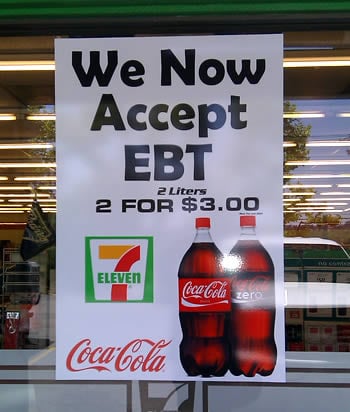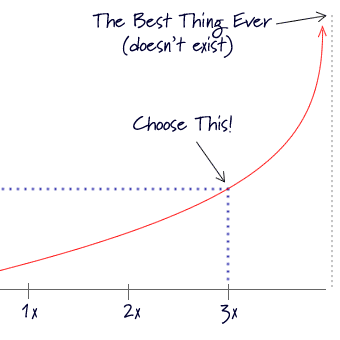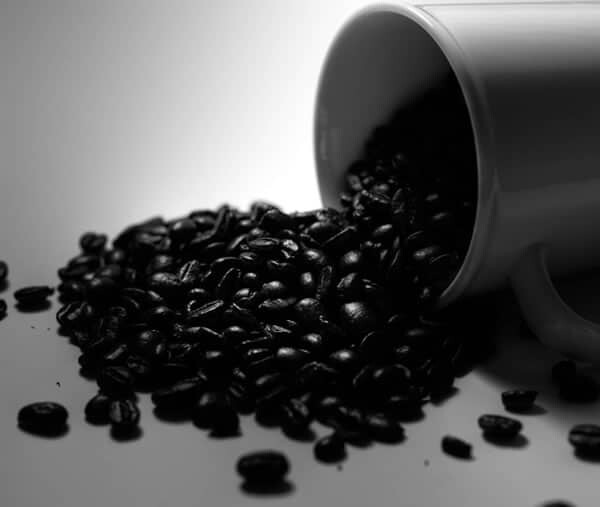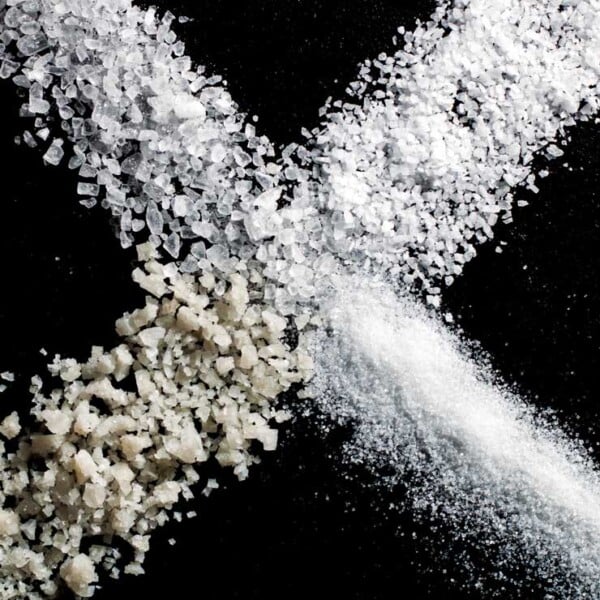Food stamps for soda
Aug 26, 2011, Updated Sep 20, 2018

The Supplemental Nutrition Assistance Program (“SNAP”, formerly called “Food Stamps”) serves nearly 46 million Americans a year. That means about one in seven Americans are now getting government assistance to buy food through this program (the number has been climbing steadily, up from about 27 million around this time in 2007).
The average monthly benefits per person are now $133.80. Multiply that out and it means we’re spending over $65 Billion a year on SNAP (and the numbers are growing every month: It’ll be over $70 Billion for 2011).
I’m certainly not opposed to ensuring that nutritious food is available to every person, but it sure seems to me that the entire SNAP program is a band-aid, not a solution to the underlying issues. But that’s a topic for another time.
The part that I am opposed to? Of that $65 Billion, about $4 Billion goes to buy soda and other sugar-sweetened beverages.
So first we subsidize the production of corn, which allows us to produce high fructose corn syrup at an incredibly low cost. Then we turn it into nutritionally-devoid sugar-water, and give people money to buy the stuff. About half of that money goes back to the manufacturers — so we’re subsidizing these companies on both ends, and all the while we’re in the middle of an obesity and health crisis!
It just doesn’t make sense.
Last October, New York asked the USDA (which administers the SNAP program) to try an experiment. They wanted to disallow the usage of SNAP benefits for purchasing sugar-sweetened beverages.
A few days ago, the USDA rejected their request. The primary reason? “Too complex.” (I’m paraphrasing). Their rejection letter [PDF] does go on to make some valid points, but in my opinion, none of them should have been dealbreakers.
It’s important to note that there are already other limits on what can be purchased with SNAP benefits (alcohol, cigarettes, foods that will be eaten in the store, and more). Many of the rules don’t make much, if any, sense from a nutritional standpoint. For a great first-hand example of this irony, read this incredible story of Chicken vs. Twinkies from Kimberly at Poor Girl Eats Well.
I also dug up this 2007 PDF, in which the USDA makes their case against restricting the use of food stamp benefits. So it seems the USDA had already dug their heels in on this issue awhile back — and still took nearly a year to reply to Mayor Bloomberg’s request.
Interestingly, in their rejection letter, they point out that they prefer incentive-based solutions, and specifically reference a pilot program in Massachusettes that “increases SNAP benefits when fruits and vegetables are purchased.” (Great!). Implementing an incentive program such as that sounds about as complicated as the one Mayor Bloomberg proposed — which pretty much invalidates their “it’s too hard!” argument.
Moreover, the USDA also administers the excellent Women, Infants, and Children (WIC) supplemental nutrition program. WIC participants “receive checks or other vouchers to purchase specific foods each month that are designed to supplement their diets with specific nutrients.”
It’s a worthy list, and includes “infant cereal, iron-fortified adult cereal, vitamin C-rich fruit or vegetable juice, eggs, milk, cheese, peanut butter, dried and canned beans/peas, and canned fish. Soy-based beverages, tofu, fruits and vegetables, baby foods, wholewheat bread, and other whole-grain options were recently added to better meet the nutritional needs of WIC participants.” (Source, PDF)
So it seems the USDA is talking out of both sides of its mouth. They claim that they don’t have the ability to restrict what food stamps should be used for (even though they already do have some restrictions), and that it wouldn’t be effective anyway. On the other side, they administer the WIC program, quite effectively, which does exactly that.
(In case you’re wondering, in 2010 the WIC program, which is funded differently than SNAP, had about 9 million participants, at a total cost of about $6.7 Billion.)
Obviously, this one change proposed by New York would not have been enough to combat obesity in America on it’s own — that’s just silly. The USDA points out that it might not have a significant impact (or even could have some negative impacts). But when the negative impacts of sugar-sweetened beverages are already so well-known, it sure sounds like lunacy not to at least try it.
Considering that it’s supposed to be “Supplemental Nutrition Assistance,” and that soda has no nutritional merit whatsoever, I’m really struggling to see any valid reason why people participating in SNAP should be allowed to use their benefits to purchase it.
What do you think?
—
I tried to keep this post brief, since this topic is already being covered quite well. I recommend reading these excellent articles by Megan Cottrell, Tom Laskawy, and Andy Fisher for more.
Want to hear something positive about SNAP? Recipients can use their benefits to to buy seeds and plants which produce food to eat. Nice.
Photo courtesy of The California Center for Public Health Advocacy, on Twitter at @CCPHA.




















Lau@CorridorKitchen: If you said that to my face I’d slap you. It is still MY MONEY that is going into this program. No I can’t decide what taxes I want to pay but I have a right to say what I want from those things. It is called the Supplemental Nutrition Assistance Program. 1-It’s supposed to SUPPLEMENT SNAP participants diets. 2-The second word is NUTRITION. How is soda, candy, chips and Twinkies nutritional? 3-Wouldn’t it bother you if your hard earned dollars went to someone and they bought steak and expensive seafood in which you can not afford yourself? 4-I’m all for helping people, but when I am being taken advantage of and my money is going down the crapper because these people don’t want to buy meal making foods, I have the right to be pissed off. 5-I am a cashier and I have seen people buy nothing but… Read more »
Wow. You sound beyond ignorant. Some form of FOOD STAMPS has been around since the 1940’s. I love how you point out the name as if because it says “nutritional” in it now, everything that has always been bought with food stamps should be changed. They changed the name only to encourage people to buy healthier. Not force it. It only became known as SNAP as of 2008. Plenty of people on food stamps are educated. You make me sick even trying to imply this. My step-dad went through 4 years of university and worked at the same job for 20 years. He got injured and disability pays him nothing even close to his old wages. Yet, he still has the same amount of costs coming in. Most of the people I know on SNAP benefits have gone to college and have just been unlucky in certain aspects of their… Read more »
I have been struggling with my own judgmental attitudes regarding SNAP benefits and started doing some research of my own to see if I could change my cynicism. Unfortunately, it only seems to get worse the more I know about the benefits. I don’t understand how WIC can regulate food but SNAP can’t. I also feel like people receiving SNAP benefits have very little incentive to learn how to shop well for groceries. As a mom of three in a family of five, we started out our family as poor college students. We have never received government assistance and have always been on a budget, even now that my husband is making a very good living as a professional. I learned very early on to coupon, to buy what is on sale and to stockpile. Now, don’t get me wrong, I’m not the “extreme couponing” type. I buy what our… Read more »
I’ll say one more thing, inspired by the Andrew’s interview with Josh Viertel: let’s try a positive model. Punishing the poor by restricting their food choices is not the solution, as good as the intentions behind it might be. We need incentives rather than restrictions. Like Josh’s example about doubling SNAP benefits at farmers’ markets. That is in place in some cities and it works. The problem is not that there are so many bad food choices out there (I wish there weren’t) but that we subsidize the poor choices and make the better ones hard to reach. This is an economic issue, and it’s something I remember recognizing as a very young child: WHY is healthy food more expensive than junk food? It’s just plain stupid, and wrong. We have got to turn the tables on food prices if we expect people with low incomes to change their habits.
Its not a “soda ban” rather a ban on added sweeteners to certain drinks
, calling it a “soda ban” makes it an easy sell
Your end point is illustration of the problem of Washington, similar to tax credits for certain corporations and not others, why should florida citrus growers get subsidies for a product that is almost no different than soda, also you fail to take into account individual diet needs, unlike WIC, SNAP is designed to be flexible, a blue collar worker for example on food stamps needs a higher calorie diet than a female secretary at the dmv, similarly females have different diet needs than males as noted by the usda. Sugar is food, so is fat, for instance a danish butter cookie or shrimp scampi is bad because of its butter in excess, should we ban butter?, many ethnic grocery stores carry food. The soda ban is as ridiculous as calling nba players obese, lazy, and so on and they drink gatorade a prohibited food item, so its not the drink… Read more »
I’m another one of those moms with kids with extreme allergies – my daughter can’t even tolerate carrots or pineapple. I honestly do not think it would be that hard to limit SNAP. Hard and fast rules however tend to hurt people they were never intended to effect. Although I wonder where to draw the line do sea salt pita chips – that are corn\soy free, low in fat, only have ingredients I can pronounce equally junk as a greasy potato chip?
I also think about the mom who wants to get her kid a birthday cake. People say – buy the stuff and make your own cake. If only the person saying that knew her oven has been broken for a year and the landlord won’t fix it and she can’t afford to move.
I also think about the homeless who’d like a hot meal or cannot cook anywhere.
Yeah, drawling the line is difficult, not because what is junk but because of individual diets and preferences, for instance should we ban tacos from food stamps, fried chicken after all is oil/meat
but many would still consider it food right, soul food is fine if you were a agriculture worker needing the calories.
My perspective is that of someone who cares deeply about food, nutrition, the well-being of underprivileged populations, and the disaster our food system has become. I am also someone who works directly with the poor (especially around food security), and passionate about access to sufficient, healthful foods and the education to make healthful choices. I am all for changing the way our food system works, particularly because it is so economically unjust and the “lower classes” are restricted from the best health in many ways. I would completely advocate for say, a tax on soda whose revenue funds subsidies for fresh produce or healthcare for those who cannot afford it. See Mark Bittman for a more eloquent elaboration. However – what I cannot support, while I love your site, is your absolutist and condescending statement that people on SNAP “should not be allowed” to use their benefits on soda. Since… Read more »
Hi Lindsay,
Thanks for your insightful comments.
I completely agree with everything you said in your first paragraph — we’re totally on the same page there. And yes, Bittman is incredibly eloquent and I can’t think of I time when I’ve ever disagreed with him.
Regarding the second part: There are some items already excluded from SNAP benefits, such as alcohol. Do you think SNAP benefits should be allowed to be used to purchase alcohol? If not, then you’re drawing a line as well — just in a different spot. If so, then where do you draw the line?
A) Alcohol is not food. B) Alcohol & tobacco are restricted in other ways – age, where it’s allowed, when you can drink/smoke it. C) I disagree with SNAP’s restriction against prepared foods – I’ve worked with many homeless people who do not have access to a kitchen, so their food stamps don’t get them very far. I also think that, like alcohol, soda is not a food. You’re right – it’s both nutritionally void and detrimental to health. But our culture has categorized it as a food product, and people will choose to do whatever they want with their health. Do I think anyone “should” drink soda? Absolutely not. But it’s not my choice. I can agree to disagree with you, but your tone was what bothered me most. And as for the taxpayer argument – that’s a whole ‘nother can of worms, but I honestly don’t care if… Read more »
Soda is food, its sugar, is butter food? Its an ingredient.
Intoxication and the public backlash is the reason
I have known some people on SNAP and yes I know it is not everyone but she would tell me at least often (at the beginning of the month) that they were having steaks and ribs for dinner but then at the end of the month tell me they didn’t have any money left in their account to buy a gallon of milk. But she always seemed to have her Pepsi with her every day. I do feel like as a tax payer I should not be buying that soda for her but if i wasn’t covered I think she would spend the little money she has on soda instead of say clothes for her kids. The other thought to this is there are people who make $20 to much to qualify for assistance who can’t afford ramen noodles.
I suggest a version of the “Golden Rule” the one who pays the gold makes the rule. If people are accepting food stamps (and I’m tired of trying to jazz them up with a new name…it’s welfare) then they should have to accept limitations on what the stamps can purchase. It really bugs me to be behind an apparently able bodied young person who purchases junk with food stamps and then pulls out the mean green for cigarettes and alcohol. Not to mention what they purchase with the food stamps…junk food which is NOT inexpensive. I was on the board of a homeless family shelter and one of our missions was to teach our families about shopping for and preparing food. I was stunned by the inability to even prepare simple items. If you can’t ‘nuke’ it in the microwave then forget it. I’m sure that if recipients couldn’t buy… Read more »
I just want to comment on the pretentious overtone of this article and some of the comments. Not everyone on SNAP has young kids. There are plenty of adults on the program as well. I’d like to see you tell a full-grown adult or even a teenager that they can’t drink what they want. Soda wouldn’t be popular if people didn’t love it. And if you live your whole life being concerned by what’s cheap and not what’s healthy, that ninety-nine cent two liter of cola or that ninety-nine cent jug of blue “chemical” juice seems loads better than pricy all natural juices. Water is “free”, sure, but sometimes people bore of the taste of water. Almost everyone I know drinks full calorie sodas and I can’t say that any of them are overweight or obese. That’s because they believe in this wonderful thing called moderation. A glass of soda… Read more »
Hi Lena, Thanks for your comments – I appreciate immensely having your perspective in this conversation, and my apologies if I have been coming across as pretentious. Certainly not my goal. It’s not usually my style to tell anyone what they should or shouldn’t eat, and I am the first to admit that I don’t eat “perfectly” all the time (there’s no such thing!). I get bored with water, too. There’s a big difference between telling someone who is spending his or her own money what they can or can’t (should or shouldn’t) buy/eat — and someone who is spending taxpayer dollars (which means it’s my and your money) to make those purchases. If people want to eat junk food (however you define it), then so be it. But if they want to use my money to do it, that’s where I take issue. It’s called the “Supplemental Nutrition Assistance… Read more »
Do we tell public employees what they can and cannot eat?
Are SNAP recipients working for their benefits?
Public employees have an employment agreement under which they are earning their wages. They are free to do with THEIR money, whatever they choose (within the law).
SNAP recipients are under no such work for wages agreement.